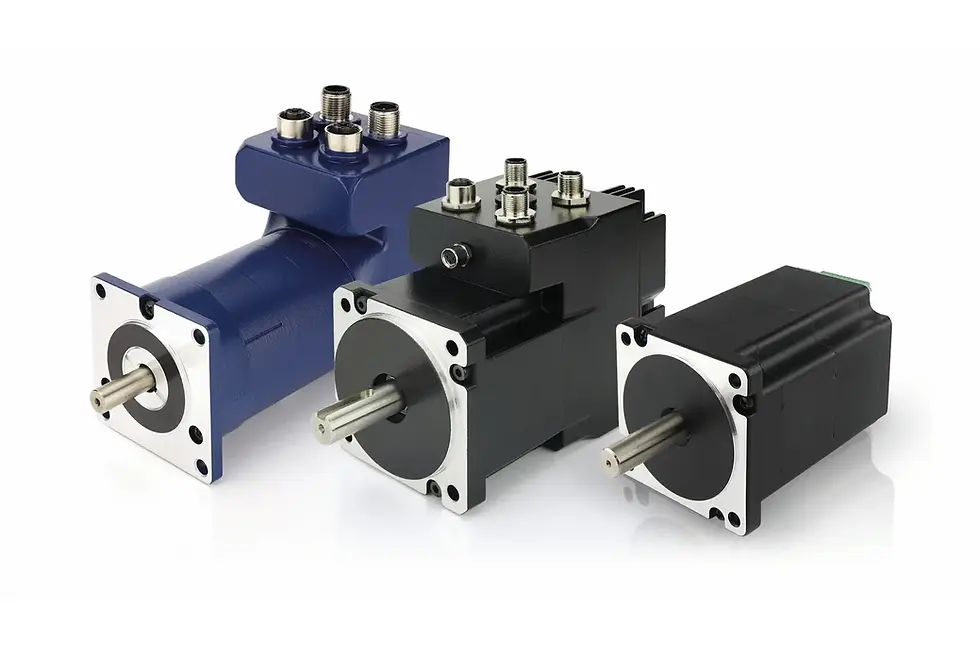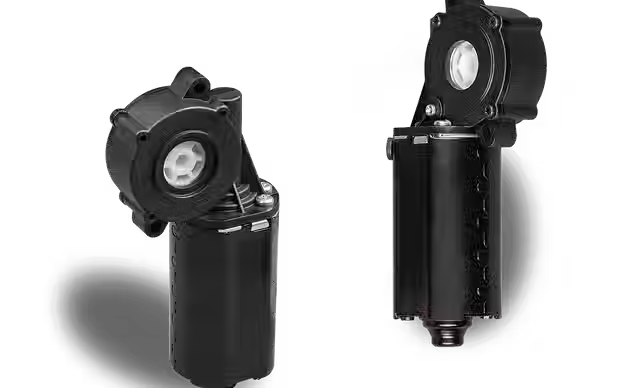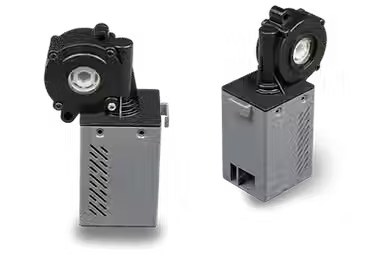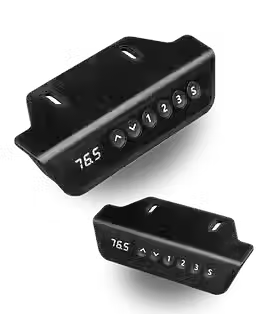A Smart Motor Controller
- Xie
- Jul 28, 2025
- 8 min read
The Future of Smart Motor Controllers in Automation
The landscape of automation is rapidly evolving, with Smart Motor Controllers (SMCs) leading the charge. These devices not only enhance machine performance but also contribute to energy efficiency and operational savings. As industries strive for increased automation, the demand for advanced SMCs is set to skyrocket in the coming years, paving the way for unprecedented technological advancements.

Enhancements in Smart Motor Controllers
Innovative Smart Motor Controllers are incorporating features such as real-time diagnostics and predictive maintenance. By leveraging data analytics, these controllers can preemptively identify potential issues, thus minimizing downtime and enhancing overall system reliability. As industries embrace Industry 4.0 protocols, the integration of SMCs into IoT environments will streamline operations like never before. Here is our homepage
Key Benefits of Using Smart Motor Controllers
Implementing a Smart Motor Controller can significantly elevate operational efficiency. Below are some critical benefits of adopting these systems:
Optimized energy consumption
Enhanced performance monitoring
Streamlined maintenance procedures
Improved safety features
With the above advantages, the transition to Smart Motor Controllers is clearly essential for businesses seeking a competitive edge in automation.
Feature | Benefit |
Real-Time Monitoring | Immediate issue resolution |
Predictive Maintenance | Reduced downtime |
Energy Efficiency | Cost savings |
Future Trends in Smart Motor Controllers
As we look ahead, advancements will likely focus on further integration with AI and machine learning, allowing for smarter automation systems. The capabilities of SMCs will evolve, providing users not only with control but also with decision-making insights.
Explore more insightful articles like this one – we have plenty more for you to discover here !
Integration with AI
Greater data analytics
Enhanced user interfaces
"The future of Smart Motor Controllers will redefine how industries approach automation, making them indispensable in modern machinery."
Key Features of Advanced Motor Control Systems
The Smart Motor Controller is revolutionizing the way we manage motor systems. With increased efficiency and precision, these controllers optimize performance and reduce energy consumption significantly. Imagine a world where motors can easily adapt to varying load conditions and operational demands, enhancing both lifespan and reliability. This adaptability is not just a feature; it’s a necessity in today’s fast-paced industrial environments.
If you have any questions or are interested in our products, feel free to contact us
Enhanced Efficiency
The integration of advanced algorithms in Smart Motor Controllers ensures that the motors operate at their peak efficiency. This means not only lower energy costs but also smoother operation and minimized wear and tear on machinery. By continuously monitoring performance metrics, these controllers can adjust parameters in real time, leading to consistent and reliable performance.
Versatility and Adaptability
Smart Motor Controllers are designed to be versatile, accommodating a range of applications from automotive to industrial automation. Their adaptability allows them to be deployed in various settings with minimal reconfiguration required. This is particularly beneficial for enterprises looking to streamline operations without significant upfront investments in new technology.
Real-time monitoring and diagnostics
Improved torque control
Energy-saving modes
One of the standout features of Smart Motor Controllers is their ability to perform diagnostics in real time. This not only aids in preventing breakdowns but also allows for predictive maintenance, further enhancing operational longevity.
Feature | Benefit |
Real-time Monitoring | Immediate feedback on performance |
Energy Efficiency | Reduced operational costs |
Flexibility | Easy integration across systems |
Cost-effectiveness
Implementing Smart Motor Controllers leads to long-term savings, especially in industries where motors are central to operations. The initial investment is outweighed by the operational efficiencies gained and the reduction in energy costs. The return on investment is often seen in reduced downtime and maintenance needs.
Lower operational costs
Increased motor lifespan
Enhanced safety features
“Investing in a Smart Motor Controller is an investment in future-proofing your operations. The efficiency and adaptability speak volumes.”

How Smart Motor Controllers Enhance Efficiency
Smart Motor Controllers are revolutionizing the way industries manage energy consumption and operational performance. By integrating advanced technology, these controllers optimize energy use, leading to substantial cost savings and improved efficiency. With real-time monitoring and automated adjustments, a Smart Motor Controller ensures that motors operate only when necessary, significantly reducing waste and increasing the lifespan of equipment.
Benefits of Smart Motor Controllers
The smart motor revolution brings numerous advantages to various sectors. With built-in sensors and connectivity features, these controllers can collect data to make informed decisions, enhancing performance across the board. This data-driven approach allows for predictive maintenance, minimizing downtime and ensuring seamless operations.
Here is our homepage
Key Features
Smart Motor Controllers are equipped with numerous features that enhance their functionality. Some key attributes include:
Real-time data analytics for performance tracking
Remote monitoring capabilities via mobile applications
Dynamic load monitoring to optimize energy consumption
Feature | Benefit |
Energy Savings | Lower utility bills |
Predictive Maintenance | Reduced downtime |
Remote Access | Convenient monitoring |
Conclusion
Integrating a Smart Motor Controller into your operations can lead to significant efficiency gains. Embrace this technology to stay competitive and forward-thinking.
Explore various models to find the best fit
Consider consulting professionals for installation
Track your energy savings over time
"Investing in a Smart Motor Controller is investing in a sustainable future for your business."
Applications of Intelligent Motor Management Solutions
Smart Motor Controllers are revolutionizing the management of electric motors across various industries. By integrating advanced analytics and automation, these solutions optimize motor performance, enhance energy efficiency, and reduce operational costs. Significant applications include manufacturing automation, renewable energy systems, HVAC systems, and industrial machinery control. With their ability to monitor and control motor functions, Smart Motor Controllers ensure seamless operations and prolonged equipment life.
Manufacturing Automation
In the manufacturing sector, Smart Motor Controllers play a pivotal role in enhancing productivity and reducing downtime. By effectively managing motor speeds, torque, and loads, these controllers ensure that machines operate at peak efficiency. This leads to higher output and allows for quick adjustments to unexpected changes in production requirements, substantially improving operational flexibility.
HVAC Systems
Smart Motor Controllers are also instrumental in the operation of heating, ventilation, and air conditioning (HVAC) systems. They enable precise control of fan motors, compressor speeds, and pumps, all of which contribute to achieving optimal indoor air quality and energy savings. With real-time monitoring, these systems adapt to changing environmental conditions, ensuring comfort without wasting energy.
Renewable Energy Systems
When it comes to renewable energy systems, Smart Motor Controllers are key players. They assist in the integration of wind turbines and solar power systems, optimizing energy capture and distribution. This adaptive management not only enhances energy efficiency but also aligns with global sustainability goals.
Versatile energy management
Environmentally friendly operations
Cost reduction
“Smart Motor Controllers are indeed the backbone of modern motor management, combining intelligence with efficiency to meet the demands of today’s industries.”
Choosing the Right Smart Motor Controller for Your Needs
When it comes to automation in various applications, selecting the right Smart Motor Controller is crucial. These controllers not only enhance performance but also improve energy efficiency and reliability in systems. As technology evolves, understanding your specific requirements becomes increasingly important in making the best choice for your operations.
Understanding Your Application
Before purchasing a Smart Motor Controller, assess your application's specific needs. Is it for robotics, HVAC systems, or some other machinery? Each application calls for distinct features, such as load capacity, speed control, and communication protocols. Evaluating these factors will help you find the perfect controller for efficient operation.
Key Features to Consider
Smart Motor Controllers come loaded with features. Key aspects to watch for include:
Speed control methods
Feedback capabilities
Compatibility with various motors
Protection features
Ease of programming and integration
Feature | Importance |
Speed Control | Essential for dynamic operations |
Feedback Mechanisms | Important for precise control |
Budget Considerations
Your budget will influence the final decision on which Smart Motor Controller to purchase. While it might be tempting to choose a lower-cost option, consider the long-term benefits of investing in a higher-quality controller.
Initial costs vs. long-term savings
Maintenance and operational expenses
Future scalability options
"Choosing the right Smart Motor Controller can lead to improved efficiency and performance in your applications."

Integrating Smart Motor Controllers in Industrial Settings
Smart motor controllers are revolutionizing industrial automation by providing enhanced control and efficiency. These advanced devices offer precise monitoring and management of motor operations, contributing to better performance and reduced energy costs. By integrating smart motor controllers into existing systems, industries can achieve higher productivity and reliability, pushing the boundaries of traditional manufacturing processes. This integration not only simplifies motor control but also enables real-time data analysis, ensuring proactive maintenance and improved system longevity.
Key Features of Smart Motor Controllers
The benefits of smart motor controllers extend beyond basic motor management. They come equipped with features such as programmable settings, remote monitoring, and predictive analytics. These functionalities empower operators to optimize motor performance, react swiftly to operational changes, and prevent unexpected shutdowns. The integration of these features allows facilities to maintain high operational standards while minimizing downtimes and maximizing efficiency.
Benefits of Using Smart Motor Controllers
Utilizing smart motor controllers presents numerous advantages, including:
Energy savings through optimized performance
Enhanced system diagnostics for easy troubleshooting
Flexibility to adapt to various industrial applications
Remote access for monitoring and control
Feature | Benefit |
Real-time Monitoring | Immediate troubleshooting and diagnostics |
Energy Management | Reduction in utility costs |
Conclusion
Integrating smart motor controllers is a strategic move for industries aiming to enhance operational efficiency. The ability to monitor and control motors efficiently leads to significant productivity gains. The technology is worth considering for those looking to modernize their operations.
Contact us today for more information.
Share your experiences with smart motor controllers in the comments!
The future of industrial automation lies in the integration of smart technologies like smart motor controllers, driving efficiency and innovation.
Frequently Asked Questions About Smart Motor Controllers
Smart motor controllers are essential devices that significantly enhance the management and operation of electric motors. They employ advanced algorithms and sensor technologies to optimize performance and efficiency. Here, we delve into common inquiries regarding smart motor controllers to help you understand their capabilities better.
What are the benefits of using a Smart Motor Controller?
Smart motor controllers offer several advantages, including increased energy efficiency, reduced maintenance costs, and improved system reliability. They actively monitor motor conditions, allowing for predictive maintenance and minimizing downtime. By incorporating intelligent controls, these devices help achieve better performance, making them ideal for various applications.
Enhanced performance and reliability
Lower operational costs
Predictive maintenance capabilities
How do Smart Motor Controllers enhance energy efficiency?
Smart motor controllers optimize energy consumption by adjusting motor speed and torque to match load demands. They can modulate output based on real-time data, therefore avoiding energy wastage. This level of efficiency leads to substantial savings on electricity bills while lowering the environmental impact.
Feature | Benefits |
Energy Monitoring | Identifies inefficiencies |
Predictive Maintenance | Reduces downtime |
How can I choose the right Smart Motor Controller for my application?
Choosing the appropriate smart motor controller involves assessing your specific application needs, including load type and communication protocols. Compatibility with existing systems is also crucial. By consulting technical specifications, you can select a controller that offers optimal support for your motors.
To meet the ultimate in efficiency and responsiveness in modern applications, many engineers and designers are turning to more specialized powertrains. If you're looking for a drive solution that combines speed and stability, the Speed-focused Motor is the ideal choice. It not only improves overall operating efficiency, but also demonstrates superior acceleration and precise control in mission-critical applications.
In many applications where high load capacity is required, high speed is not enough. A drive solution with strong torque output is the key, and the Torque-focused Motor is designed to cope with high loads and high resistance environments, and maintains a stable and strong power output at low speeds, which is widely used in industrial automation, heavy machinery, and lifting and lowering systems in the smart home.
Consider load requirements.
Evaluate communication options.
Check compatibility with existing hardware.
Investing in a smart motor controller can lead to transformative improvements in performance and energy management.






Comments